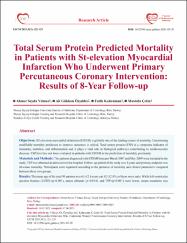| dc.contributor.author | Yılmaz, Ahmet Seyda | |
| dc.contributor.author | Özyıldız, Ali Gökhan | |
| dc.contributor.author | Kahraman, Fatih | |
| dc.contributor.author | Çetin, Mustafa | |
| dc.date.accessioned | 2023-02-20T06:14:17Z | |
| dc.date.available | 2023-02-20T06:14:17Z | |
| dc.date.issued | 2021 | en_US |
| dc.identifier.citation | Yılmaz, A.S., Özyıldız, A.G., Kahraman, F. & Çetin, M. (2021). Total Serum Protein Predicted Mortality in Patients with St-elevation Myocardial Infarction Who Underwent Primary Percutaneous Coronary Intervention: Results of 8-Year Follow-up. E Journal of Cardiovascular Medicine, 9(2), 122-129. http://doi.org/10.32596/ejcm.galenos.2021-05-30 | en_US |
| dc.identifier.issn | 2147-1924 | |
| dc.identifier.uri | http://doi.org/10.32596/ejcm.galenos.2021-05-30 | |
| dc.identifier.uri | https://hdl.handle.net/11436/7620 | |
| dc.description.abstract | Objectives: ST-elevation myocardial infarction (STEMI) is globally one of the leading causes of mortality. Determining
modifiable mortality predictors to improve outcomes is critical. Total serum protein (TSP) is a composite indicator of
immunity, nutrition, and inflammation and it plays a vital role in biological pathways contributing to cardiovascular
diseases. TSP level has not been evaluated in patients with STEMI in the prediction of mortality previously.
Materials and Methods: The patients diagnosed with STEMI between March 2007 and May 2009 were included in the
study. TSP was obtained at admission to the hospital. Follow-up period of the study was 8 years and primary endpoint was
all-cause mortality. Participants were separated according to the presence of mortality and clinical parameters compared
between these two groups.
Results: The mean age of the total 99 patients was 61±12.4 years and 82 (82.8%) of them were male. While left ventricular
ejection fraction (LVEF) (p=0.001), serum albumin (p=0.014), and TSP (p<0.001) were lower, serum creatinine was higher (p=0.003) in the mortality group. Diabetes mellitus (p=0.007), increased age (p=0.027), LVEF (p=0.006), serum
creatinine level (p=0.023), and TSP (hazard ratio: 0.159, 95% confidence interval: 0.062-0.408, p<0.001) predicted
mortality independently.
Conclusion: TSP level predicted all-cause mortality independently in STEMI patients who underwent primary
percutaneous coronary intervention during 8-year follow-up | en_US |
| dc.language.iso | eng | en_US |
| dc.rights | info:eu-repo/semantics/openAccess | en_US |
| dc.subject | ST-elevation myocardial infarction (STEMI) | en_US |
| dc.subject | Total serum protein (TSP) | en_US |
| dc.subject | Mortality | en_US |
| dc.subject | Acute coronary syndrome | en_US |
| dc.subject | Malnutrition | en_US |
| dc.title | Total serum protein predicted mortality in patients with st-elevation myocardial ınfarction who underwent primary percutaneous coronary ıntervention: Results of 8-year follow-up | en_US |
| dc.type | article | en_US |
| dc.contributor.department | RTEÜ, Tıp Fakültesi, Dahili Tıp Bilimleri Bölümü | en_US |
| dc.contributor.institutionauthor | Yılmaz, Ahmet Seyda | |
| dc.contributor.institutionauthor | Özyıldız, Ali Gökhan | |
| dc.contributor.institutionauthor | Çetin, Mustafa | |
| dc.identifier.doi | 10.32596/ejcm.galenos.2021-05-30 | en_US |
| dc.identifier.volume | 9 | en_US |
| dc.identifier.issue | 2 | en_US |
| dc.identifier.startpage | 122 | en_US |
| dc.identifier.endpage | 129 | en_US |
| dc.relation.journal | E Journal of Cardiovascular Medicine | en_US |
| dc.relation.publicationcategory | Makale - Uluslararası Hakemli Dergi - Kurum Öğretim Elemanı | en_US |


















